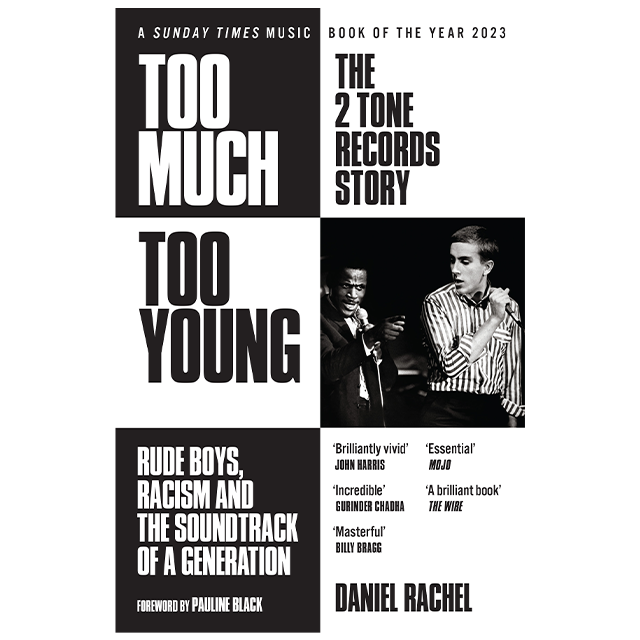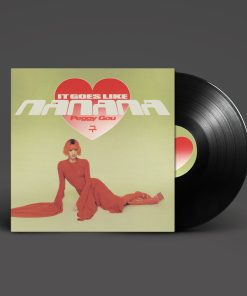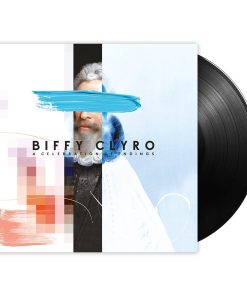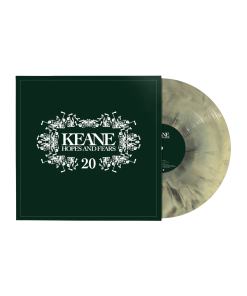Too Much Too Young – The 2 Tone Records Story: Signed Book Daniel Rachel
$ 15,99 $ 9,59
Paperback signed bookplate edition, shipping early May!
#2 UNCUT BOOK OF THE YEAR 2023
- ‘An incredible and detailed account of a massive watershed moment in British culture’ – Gurinder Chadha, OBE
- ”A brilliantly vivid account of one of British pop culture’s most inspiring movements” – John Harris
- ”A comprehensive, cautionary but nonetheless celebratory saga of the 2 Tone label.” – Pauline Black, OBE
- ”This feels like the definitive story of 2 Tone. Masterful.” – Billy Bragg
In 1979, 2 Tone exploded into the national consciousness as records by The Specials, The Selecter, Madness, The Beat, and The Bodysnatchers burst onto the charts and a youth movement was born.
2 Tone was black and white: a multi-racial force of British and Caribbean island musicians singing about social issues, racism, class and gender struggles. It spoke of injustices in society and took fight against right wing extremism.
The music of 2 Tone was exuberant: white youth learning to dance to the infectious rhythm of ska and reggae; and crossed with a punk attitude to create an original hybrid. The idea of 2 Tone was born in Coventry, masterminded by a middle-class art student raised in the church. Jerry Dammers had a vision of an English Motown. Borrowing £700, the label’s first record featured ‘Gangsters’ by The Specials’ backed by an instrumental track by the, as yet, unformed, Selecter. Within two months the single was at number six in the national charts. Dammers signed Madness, The Beat and The Bodysnatchers as a glut of successive hits propelled 2 Tone onto Top of the Pops and into the hearts and minds of a generation. However, soon infighting amongst the bands and the pressures of running a label caused 2 Tone to bow to an inevitable weight of expectation and recrimination.
Still under the auspices of Jerry Dammers, 2 Tone entered in a new phase. Perhaps not as commercially successful as its 1979-1981 incarnation the label nevertheless continued to thrive for a further four years releasing a string of fresh signings and a stunning endpiece finale in ‘(Free) Nelson Mandela’.
Told in three parts, Too Much Too Young is the definitive story of a label that for a brief, bright burning moment, shaped British culture.
Fast Delivery and Professional Packaging
Our long-standing relationship with UPS FedEx DHL and other carriers around the world gives us the ability to provide various shipping options. Our warehouse personnel will pack all goods to our exacting requirements. Your goods will go through an extensive inspection and will be securely secured prior to being shipped. Every day we ship thousands of packages to clients from all over the world. This is a sign of our determination to be the largest online retailer in the world. There are distribution centers and warehouses in Europe and the USA.
Orders that contain more than 1 item are assigned processing periods in accordance with the item.
Prior to shipment, all purchased items will be thoroughly inspected. The majority of orders are shipped within 48 hrs. Delivery is expected to take between 3 and 7 days.
Returns
The stock is dynamic and we do not completely manage it because multiple parties are involved, which includes our factory and warehouse. The actual stock can fluctuate at any time. It's possible that the stock may run out after your order has been processed.
Our policy lasts for 30 days. Unfortunately, if thirty days have passed from the date you purchased the item, we will not be able to offer you a return or exchange.
The item should not be used, and it must be in the original packaging. The item should be in the original packaging.
Related products
Vinyl 12" Single
5 EP: Limited Edition Pink + Purple Marbled Vinyl EP Slowdive
Vinyl LP
Vinyl LP
Vinyl LP
Vinyl LP
Vinyl LP
Vinyl 12" Single
Vinyl LP
Vinyl LP
Vinyl LP





































